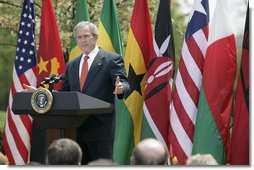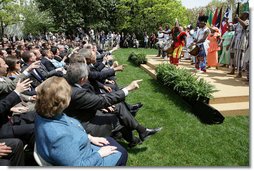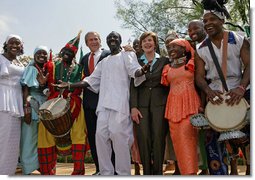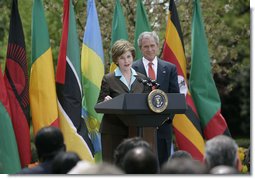| ||||||||||||||||||||||||||||||||||||||||||||||||||||||||||||||||||||||||||||||||||||||||||||||||||||||||||||||||||||||||||||||||||||||||||||||||||||||||||||||||||||||||||||||||
|
1:10 P.M. EDT MRS. BUSH: Welcome, everyone, to the White House. Thank you very much for being a part of this Malaria1 Awareness2 Day. Today, citizens around the world are making a historic commitment to end malaria. In European capitals, parliaments are debating how their governments can help. In Ontario, Canadians are commemorating3 their first World Malaria Day by raising money for bed nets for Uganda. Across the continent of Africa, people are teaching their families, friends, and neighbors how to protect themselves from this deadly disease.
The American people, through their government, are working to end this epidemic5. In 2005, President Bush announced the President's Malaria Initiative -- a five-year, $1.2 billion program to combat malaria in the hardest-hit African nations. So far, the initiative has distributed life-saving medicines, insecticide sprays, and mosquito nets to millions of Africans. The initiative calls on developed countries, private foundations, religious institutions, volunteer groups, and individual citizens to reduce the suffering and death caused by malaria. The good news is that there's something simple and inexpensive that all of us can do to help. One of the best protections against malaria is a long-lasting, insecticide-treated bed net. Only a fraction of African homes have the mosquito net they need, but any individual who can raise $10 can buy a bed net, and save a life. Throughout our country, caring citizens are answering this call to help. In sports leagues, in Boys and Girls Clubs, and in church groups, Americans are raising money for mosquito nets. And they're raising awareness about malaria. In school, children are learning about the disease, and what they can do to defeat it. This morning, I visited the Friendship Public Charter School here in Washington, where first graders and I read Nets are Nice. Nets are Nice is a picture book that teaches American children what they can do for children in Africa. Later, fifth grade students and government officials teamed up to play Malaria Jeopardy6. Turns out our Malaria Coordinator7, Admiral Ziemer, is a pretty tough competitor. (Laughter.) Inside the gym, the fifth graders had a hoops-shooting contest. For every basket the students made, the NBA and the WNBA's "Nothing But Nets" program donated a bed net to Africa. The kids did so well, "Nothing But Nets" is announcing a contribution of $5,000 dollars to purchase 500 bed nets in Africa. And we have a few of those players here with us today. Where are they? Do you all mind standing8 up? Thanks so much for being a part of it. (Applause.) Thanks, you all, and thanks to the NBA and the WNBA.
Today, I'm delighted to announce a new project. With the Global Business Coalition10, the American people -- through the Malaria Initiative, and the President's Emergency Plan for AIDS Relief -- will provide half-a-million bed nets to the nation of Zambia. (Applause.) President Bush announced Zambia as a PMI focus country in December, at the White House Summit on Malaria. In Zambia -- a country of 10 million people -- there are roughly 4 million documented cases of malaria every year. Adding to the crisis is a high prevalence of HIV/AIDS. More than a million Zambian adults and children are living with HIV -- which means their immune systems are more susceptible11 to malaria. Malaria kills 50,000 Zambians every year. Through the new partnership12 we're announcing today, mosquito nets will be distributed to Zambia's most vulnerable households. With help from the RAPIDS Consortium, they'll reach about 1 million young children, pregnant mothers, and people infected with HIV -- almost 10 percent of Zambia's population. These nets will help mothers sleep soundly at night, knowing that their babies are safe. They'll help people with HIV live positively13. And they'll give a country devastated14 by malaria the promise of good health and renewed hope. Thank you to everyone here who's made this partnership possible. This summer, I'll visit Zambia to observe the net distribution. And I'm looking forward to traveling throughout Africa, to meet people who are working to overcome malaria and other obstacles to development. On my past trips to Africa, I've heard tragic15 stories about the human toll16 of diseases like malaria and HIV/AIDS. But I've also been inspired by the men and women who've told me these stories -- men and women who are determined17 to secure opportunity, prosperity, and good health for their children. The American people are proud to stand with them. Our country believes that every life, in every land, has value and dignity. And on this first Malaria Awareness Day, we look to the millions of lives threatened by this disease, and we reaffirm our commitment to saving them.
THE PRESIDENT: Thank you for coming. Welcome to the White House. The Rose Garden has witnessed many historic events. This afternoon we gather to mark something completely new, the first ever Malaria Awareness Day in the United States, and I'm glad you're here to join us. (Applause.) On Malaria Awareness Day, we focus our attention on all who suffer from this terrible disease -- especially the millions on the continent of Africa. We remember the millions more who died from this entirely18 preventable and treatable disease. As a compassionate19 nation, we are called to spread awareness about malaria -- and we're called to act. That's what compassionate people do. When they see a problem, they act. And that's what we're here to talk about. On this special day, we renew our commitment to lead the world toward an urgent goal, and that is to turn the tide against malaria in Africa, and around the globe. I want to thank Laura for being my wife -- (laughter) -- and taking the lead on this. (Applause.) Mr. Secretary, thank you for joining us. Mike Leavitt, the Department of Health and Human Services. Ambassador Randy Tobias. He now runs USAID. Prior to this job, he led America's monumental effort to confront and deal with the HIV/AIDS epidemic on the continent of Africa. Thank you for your leadership. Karen P., it's good to see you. Ambassador Hughes is with us. Admiral Ziemer. So if you want to solve a problem, you put a problem solver in charge. And that's what Admiral Ziemer does. He's a problem solver. It makes it easier for me, when I say to other nations -- like with President Lula. He came to visit at Camp David. We were trying to figure out ways we could work together to show our hemisphere and the world that Brazil and the United States shares a compassion about people. And so I said, why don't we work together to eradicate20 malaria in parts of Africa? Call Ziemer. (Laughter.) He'll see to it that the strategy gets implemented21. To show that we're a serious nation, we have named a coordinator, somebody in charge. It's important for me and Laura to know that a good man is handling this responsibility to implementing22 a strategy. Appreciate what you're doing. I know you know that we take this initiative seriously.
I appreciate very much the fact that the World Bank is taking the lead in eradicating poverty in places like Africa, and Paul Wolfowitz, thank you for your leadership of the World Bank. And I appreciate the fact that Ann Veneman is joining us, the Executive Director of UNICEF, which is the largest purchaser of bed nets in the world. These people are here because they're committed to joining us to solve a problem that can be solved. I also thank other members of my administration here. Thank you for coming and thank you for your interest. I want to thank the members of the diplomatic corps for joining us. I appreciate you coming. I see ambassadors from countries that will be helped by this initiative, and I see ambassadors from countries that we expect to join us in this initiative. I'm looking forward to -- Mr. Ambassador, to talking to Prime Minister Abe about what Japan can do with the United States to solve this problem. I'm honored you're here. I'm looking forward to seeing the Prime Minister tomorrow evening for dinner. I thank our dance company that will be joining us in a minute. I know you're going to look forward to seeing them; so am I. So I'm warming up out here. (Laughter.) I thank our domestic and international partners. I see so many people who are -- who care about the lives of others, and are willing to do something about it. And I really appreciate you all coming. As we mark this first Malaria Awareness Day, it makes sense to begin with some facts. Every year, more than a million people die of malaria -- and the vast majority of them are children under five years old. It's a sad statistic. In some countries, malaria takes even more lives than HIV/AIDS. Malaria imposes a crippling economic burden in sub-Saharan Africa, where so many are struggling to lift their families out of poverty.
I'm sure a lot of citizens don't remember this fact, but about a century ago malaria was a serious problem. The hot and humid summers created a dangerous breeding ground for mosquitoes, and Congress would often flee the capital for months at a time. Other than that, the consequences were all negative. (Laughter.) Some foreign ambassadors to the United States are even reported to have received hardship pay for duties here in Washington. Yet, through the years, because of patient and persistent action, malaria was almost entirely eradicated in Washington and throughout the United States. In other words, we've solved this problem before. And the fundamental question is, do we have the will to do the same thing on another continent? That's really the question that faces this country and other nations around the world. My commitment is, you bet we have the will. And we've got a strategy to do so. Defeating malaria is going to be a challenge, but it's not going to require a miracle. That's what I'm here to tell you. It's going to require a smart and sustained campaign. And so what does that mean? Well, first, it means distributing insecticide-treated bed nets; secondly, expanding indoor insecticide spraying; thirdly, providing anti-malaria medicine to pregnant women, and delivering cutting-edge drugs to people living with the disease. Those are the four steps necessary to achieve our objective. Thanks to our leadership in science and technology, we have a unique ability to help in all these areas. We have a responsibility to turn that ability into action. When America sees suffering and know that our nation -- when Americans see suffering and know that our nation can help stop it, they expect our government to respond. Most Americans believe in this timeless truth: To whom much is given, much is required, and I believe in that, as well. We have a strategic interest in reducing death and disease in emerging nations of Africa. Societies with healthy and prosperous people are more likely to be sources of stability and peace, not breeding grounds for extremists and terror. It's in our strategic interests that we follow through on our pledges. I launched the President's Malaria Initiative in 2005. Through this initiative, as Laura mentioned, we're spending $1.2 billion over five years to provide bed nets and indoor spraying and anti-malaria medicine in 15 heavily effected African countries. We're working toward a historic goal to cut the number of malaria-related deaths in country by half. The Admiral has got a goal. It's a measurable goal.
A good effort of our -- of this strategy comes from the Zanzibar islands off the east coast of Tanzania. This area was once a hotbed for malaria infection. Then with the support of our malaria initiative, local residents launched a campaign called "Kataa Malaria," which is Swahili for "Reject Malaria." Workers went door to door to teach people how to use beds -- how to use bed nets. They launched TV and radio ads. They spoke in mosques about malaria prevention and treatment, and the efforts worked. One Zanzibar island reported that malaria cases during the first nine months of last year dropped by a stunning 87 percent. Another example comes from Senegal on the west coast of Africa. In one village, malaria kills half of all the children before the age of five. Imagine growing up in a village like that, imagine being a mom in a village like that. Not long ago, it looked like a two-year-old fellow named Demba Balde was going to be one of the unlucky children. His mother took him to the village health hut, which receives funding from our malaria initiative. And thanks to enhanced awareness, correct diagnosis and prompt treatment, young Demba won his battle with malaria. Every life matters to the American people. Every life is precious. Stories like these are cause for hope, and they would not be possible without the courage and commitment of our partners in Africa. This week, nations across Africa are marking their own Malaria Awareness Days. In Angola, the Ministry of Health is helping to lead a "Caravan for Life" in which health workers travel the countryside in trucks loaded with bed nets and medicines and educational materials. In Benin, almost a million dollars worth of bed nets and medicines is being distributed at an event in the capital city. In Mozambique, local residents attended a soccer tournament that featured songs and skits on how to prevent malaria. We're committed to helping our African partners build on these efforts, and so I want to share with you two new endeavors. First, America will expand our cooperation with the government of Uganda, and the non-profit group Malaria No More, to distribute more than a half-a-million bed nets in Uganda. We're going to focus this distribution on children and pregnant mothers in areas of the country with the greatest vulnerability. And when we're finished with this effort, half of all the households in Uganda will own a bed net to protect against malaria. The second new commitment is Madagascar. There, we will team up with Malaria No More and the American Red Cross to distribute bed nets to nearly 1.4 million children under the age of five. This delivery campaign will include polio vaccines to promote good overall health for children across the island. We're attacking this problem one spot at a time with a comprehensive strategy. These efforts are a good start, but on this Malaria Awareness Day, we've got to understand, it's just a start, and there's a lot of work to be done. Nations around this world have a role to play. At the G8, I'm going to raise this issue with our partners around the table. I'm going to remind them, to whom much is given, much is required, and that the United States will lead, and we expect others to follow side-by-side. (Applause.) Private citizens and organizations have an important role to play. Last December, as Laura mentioned, we held the White House Summit on Malaria to urge more non-profit groups and corporations and individuals to join the effort to wipe out this disease. The response has been encouraging. We're seeing inspiring acts of selflessness from what I've called America's armies of compassion. There's an interesting development taking place tonight. If you happen to tune into "American Idol," you will see the first ever "Idol Gives Back" campaign. This campaign will urge viewers to donate to a variety of charities, including groups devoted to fighting malaria. For all you "Idol" viewers, join this battle, join the cause to help save lives. I'm not so sure I'm going to watch it tonight, but this show does have a large group of viewers, and I really appreciate the producers for joining us. Major League Soccer is running a promotional campaign that encourages fans to make a donation to cover the cost of bed nets for a family in Africa. College students on more than 50 campuses are holding "Music to End Malaria" events to generate awareness and raise funds. The Magnum Photos agency has launched a photo narrative that depicts the devastating toll of malaria. Awareness is a part of solving the problem. You don't have to be a part of an organization to make a difference. In an elementary school in Parkersburg, West Virginia, 63 children raised enough money to buy 15 bed nets. This past Christmas, our family -- some of our family gathered in Camp David, and my brother gave us bed nets as a Christmas gift. You can do the same thing here in America. You can make an individual contribution to save somebody's life. I want to tell you what this third grader explained -- why he contributed to the program. He said, "I want to fight malaria because it's helpful, and I want to help kids in Africa because it's the right thing to do." And it is the right thing to do. And that's why we're gathered here in the Rose Garden, to commit this nation to doing the right thing, and to call upon citizens in this country to do the right thing. America is a country that gives medicine to the sick and food to the hungry and protection to the threatened, because it's the right thing to do. Malaria Awareness Day is a chance for me to thank all Americans who have donated to this cause, and urge others to do the same. It's a day to call on nations around the world to join us in a great humanitarian effort. And it's a day to remind our fellow citizens that when you help somebody live a life, it strengthens our soul and enhances our spirit. Thanks for coming, and God bless. (Applause.) END 1:34 P.M. EDT 点击  收听单词发音 收听单词发音
|
||||||||||||||||||||||||||||||||||||||||||||||||||||||||||||||||||||||||||||||||||||||||||||||||||||||||||||||||||||||||||||||||||||||||||||||||||||||||||||||||||||||||||||||||
- 发表评论
-
- 最新评论 进入详细评论页>>

 Here in the United States, concerned citizens are spreading the word about our moral obligation to defeat malaria. This disease claims more than a million lives every year. It
Here in the United States, concerned citizens are spreading the word about our moral obligation to defeat malaria. This disease claims more than a million lives every year. It  These events encourage kids to reach out to children in Africa, and they instill in our next generation America's
These events encourage kids to reach out to children in Africa, and they instill in our next generation America's  Thanks to each and every one of you for your work to help defeat malaria. Now I'd like to introduce someone else I know who's determined to end this epidemic: Ladies and gentlemen, my husband, President George W. Bush. (Applause.)
Thanks to each and every one of you for your work to help defeat malaria. Now I'd like to introduce someone else I know who's determined to end this epidemic: Ladies and gentlemen, my husband, President George W. Bush. (Applause.)  Mr. Chairman, Donald Payne, thank you for coming. We're proud you're here. I respect you, and I respect your concern for the people of Africa, and to make sure that the United States of America stays engaged in that continent in a constructive way. It's good to see Chris Smith. Thank you for coming, Chris. We're proud you're here.
Mr. Chairman, Donald Payne, thank you for coming. We're proud you're here. I respect you, and I respect your concern for the people of Africa, and to make sure that the United States of America stays engaged in that continent in a constructive way. It's good to see Chris Smith. Thank you for coming, Chris. We're proud you're here.  All of that may seem like a cause for despair. But it's not. The world knows exactly what it takes to treat and prevent malaria. We've seen this disease defeated before, right here in Washington.
All of that may seem like a cause for despair. But it's not. The world knows exactly what it takes to treat and prevent malaria. We've seen this disease defeated before, right here in Washington.  The key element to this initiative is accountability. It's a realistic agenda with a measurable goal. And today is a good day to report to the American people on the impact their dollars are having. During the first year of our initiative, we expanded malaria protection in more than 6 million Africans. We're still early in the second year, but so far we've reached another 5 million people, and by the end of 2007, we expect to reach a total of 30 million. Admiral, you're doing good work, and the American people deserve a lot of credit for supporting you.
The key element to this initiative is accountability. It's a realistic agenda with a measurable goal. And today is a good day to report to the American people on the impact their dollars are having. During the first year of our initiative, we expanded malaria protection in more than 6 million Africans. We're still early in the second year, but so far we've reached another 5 million people, and by the end of 2007, we expect to reach a total of 30 million. Admiral, you're doing good work, and the American people deserve a lot of credit for supporting you. 

